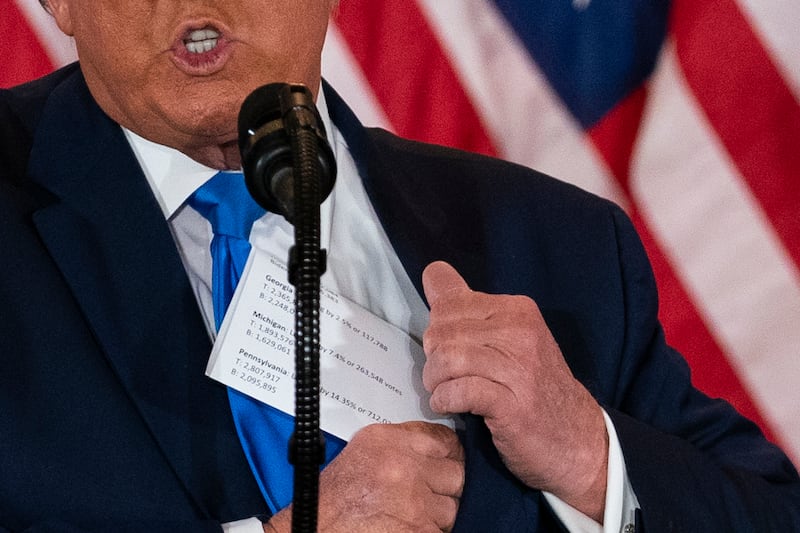Over the past several months I joined a group of notable conservatives to review every claim of fraud and irregularities brought by former President Donald Trump and his supporters in all 64 cases challenging the 2020 election. We have reached the unequivocal conclusion that Trump’s claims of election fraud are unsupported by evidence.
Additionally, our group thoroughly examined all post-election reviews and audits in six battleground states. Our newly released report, “Lost, Not Stolen: The Conservative Case that Trump Lost and Biden Won the 2020 Presidential Election,” concludes that “Donald Trump and his supporters had their day in court and failed to produce substantive evidence to make their case.”
Our 72-page report is signed by retired federal appeals court Judges J. Michael Luttig and Michael W. McConnell, former Solicitor General Theodore B. Olson, former Sens. John Danforth and Gordon H. Smith, longtime Republican election lawyer Benjamin L. Ginsberg and veteran Republican congressional chief of staff David Hoppe.
My colleagues and I have all worked in Republican politics, been appointed to office by Republicans or have otherwise been associated with the GOP. Several in our group have worked as Republican poll workers or assisted in Election Day operations, monitoring voting. None has shifted to the Democratic Party.
We share a deep concern over recent polls showing that these unproven claims have significantly impacted Americans’ confidence in election results. Our report notes that “repetition of these false charges causes real harm to the basic foundations of the country” and that having “30 percent of the country lack faith in election results based on unsubstantiated claims of a ‘stolen’ election is not sustainable in a democracy.”
Importantly, our report does not question the former president’s right to bring the 64 cases but observes: “Once they had lost, Trump and his supporters had an obligation to recognize that the election debate was over. Questions of election legality must be resolved dispassionately in courts of law, not through rallies and demonstrations.”
We found insufficient evidence to support charges that the 2020 results were fraudulent, and came after a review of all 187 counts in the 64 cases Trump and his supporters filed in Arizona, Georgia, Michigan, Nevada, Pennsylvania and Wisconsin.
For example, Trump supporters called Nevada “the big treasure trove of illegal balloting,” yet they failed to produce any evidence to support those claims. Subsequent investigations by local election officials and the Nevada secretary of state, a Republican, found only 100 cases of potential fraud; Biden won by more than 33,000 votes.
In Georgia, the Republican secretary of state conducted a full manual recount of all 5 million ballots and investigated numerous specific allegations of fraud along with the Georgia Bureau of Investigations. That resulted in discovering approximately 64 instances of potential fraud, of which 31 were administrative errors amounting to one-half of 1% of Biden’s victory there.
As these examples help illustrate, Trump’s charges of a stolen election are simply untrue.
We are a great nation founded on the rule of law, and I am hopeful that by releasing the results of our painstaking review, we will help set the record straight, once and for all.
Beyond that, I urge our fellow conservatives to offer the electorate a positive view of America’s future based on time-tested conservative values of limited government, an opportunity society, religious liberty, judicial conservatism and a strong national defense. Conservatism preserves institutions that foster these virtues. Attacking our election system as corrupt is not only inaccurate, but it breeds distrust in our democracy. Asserting allegations of fraud in the 2020 presidential election system without evidence undermines the values that undergird conservatism.
Thomas B. Griffith was a judge on the U.S. Court of Appeals for the D.C. Circuit. He is a fellow of the Wheatley Institution at Brigham Young University.


 alt=Thomas B. Griffith
alt=Thomas B. Griffith